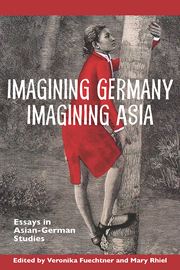Book contents
- Frontmatter
- Contents
- Acknowledgments
- Introduction
- Part I Contemporary Challenges to German Borders and Identities
- Part II Travel and Representation
- Part III Asia Inhabits Germany's Cultural and Intellectual History
- 10 The Tat Tvam Asi Formula and Schopenhauer's “Deductive Leap”
- 11 German Indophilia, Femininity, and Transcultural Symbiosis around 1800
- 12 Reading Genji in German: Reflections on World Literature and Asian-German Studies
- Bibliography
- Notes on the Contributors
- Index
12 - Reading Genji in German: Reflections on World Literature and Asian-German Studies
from Part III - Asia Inhabits Germany's Cultural and Intellectual History
- Frontmatter
- Contents
- Acknowledgments
- Introduction
- Part I Contemporary Challenges to German Borders and Identities
- Part II Travel and Representation
- Part III Asia Inhabits Germany's Cultural and Intellectual History
- 10 The Tat Tvam Asi Formula and Schopenhauer's “Deductive Leap”
- 11 German Indophilia, Femininity, and Transcultural Symbiosis around 1800
- 12 Reading Genji in German: Reflections on World Literature and Asian-German Studies
- Bibliography
- Notes on the Contributors
- Index
Summary
A Literary Globalization Gone Wrong
At the end of 2008, just in time for one of the last issues of the year, The Economist devoted an editorial to what it claimed was a special event in Japanese history: Murasaki Shikibu's Genji monogatari, known in the English-speaking world as The Tale of Genji, had turned one thousand. Yet the occasion was also of global significance, the newsmagazine quickly added, because Western scholars had considered the tale to be “the first modern or psychological novel” in the world. In addition to being the Japanese “equivalent of Homer's Iliad,” it claimed the title of the oldest prototype of an international writing system, a literary inspiration for countless commentaries, editions, paintings, transliterations, film adaptations, and manga productions around the globe. An ideal embodiment of Pascale Casanova's “world republic of letters” avant la lettre, Genji exemplified how, for once, the East did not follow the West as the origin of all good things.
Upon closer examination, though, these celebratory claims turned out to be the prolegomena to a Eurocentric worldview in which Genji's “broad appeal” was reduced to two manifestations of provincial nostalgia. First, the editorial read, “right-wing Japanese commentators” read the tale to argue “how much more sophisticated civilization was in Japan in the 11th century compared with Europe at that time”; second, “middle-aged Japanese” were abusing the text to find something “as quintessentially Japanese as flower-arranging or the tea ceremony” (143).
- Type
- Chapter
- Information
- Imagining Germany Imagining AsiaEssays in Asian-German Studies, pp. 220 - 242Publisher: Boydell & BrewerPrint publication year: 2013

